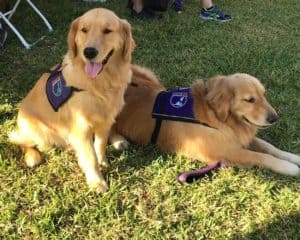Retiring Your Assistance Dog
 We all imagine the day we will be able to turn off the alarm, roll over and start the day when we want to. Ah, to dream about retirement. No one knows for sure if assistance dogs dream about their retirement, but there will come a time when a service dog will no longer be able to perform the tasks that they have loyally provided to their human counterpart. If you are a person who is paired with and depends on an assistance dog, you need to be prepared and plan accordingly for retiring your assistance dog. You depend on your canine partner every day and you may not be objective in your observations of what is happening with him/her.
We all imagine the day we will be able to turn off the alarm, roll over and start the day when we want to. Ah, to dream about retirement. No one knows for sure if assistance dogs dream about their retirement, but there will come a time when a service dog will no longer be able to perform the tasks that they have loyally provided to their human counterpart. If you are a person who is paired with and depends on an assistance dog, you need to be prepared and plan accordingly for retiring your assistance dog. You depend on your canine partner every day and you may not be objective in your observations of what is happening with him/her.
How do I know the time is coming to consider retiring my assistance dog?
If your assistance dog is nearing the ten-year mark (depending on breed) it’s time for you to start considering the following:
- Has the veterinarian diagnosed your service dog with arthritis, cataracts, diabetes, or other age-related conditions and treatment doesn’t seem to improve the condition?
- Does your assistance dog seem to require way more sleep than he used to? Is he slow moving when it’s time to go to work? Does he seem to tire easily?
- Do commands seem to be willfully ignored or are tasks only partially completed? This may be result of hearing or memory loss. He may not be able to understand your request.
- Does your service animal seem to be happy and still expresses a desire to please? Most service animals are enthusiastic workers. If this desire seems to be fading away it may be time to ease the workload.
As difficult as it might be to acknowledge, if your answer was yes to any of the above items, it’s time to apply for a new assistance dog. Wait lists can be very lengthy; some organizations taking 3-5 years to place clients with trained service dogs. Your lifestyle is dependent on your assistance dog being by your side and helping you stay active. You will need time to train with a new assistance dog and build that relationship. This must factor into your decision of when to apply for a new assistance dog. Don’t delay the application process.
Expectations for everyone involved
During this transition time many organizations offer their clients the option of having the retiree continue to be a part of their family unit, and they may also offer to rehome your existing service dog if you are not able to care for more than one dog physically or financially. Genesis Assistance Dogs, Inc. offers this option for previously trained Genesis dogs. We promise to find the best home possible for your retiring Genesis dog.
Retiring your mobility service dog is not easy. Your current dog still wants to please you and you want only what’s in his best interest. Make no mistake about it, there will be a grieving period as you retire your dog. For him, and for you. If you need to rehome your companion, make sure to do it in stages so that he/she doesn’t feel abandoned. Gradually introduce him/her to the new caretaker and home.
Remember that your new mobility assistance dog will be eager to build a relationship with you. Be realistic with your expectations. He/she will not be a clone of your former service dog and you cannot expect perfection the first time you train together. Keep in mind how much dedication and time it took to build trust with your former dog. Give your new dog time to sync with you. There will be a unique learning curve specific to the personality of your new companion meshing with your needs. The love and respect for one another will develop quickly if you invest the time and energy required to work with this new and eager to please member of your family.

